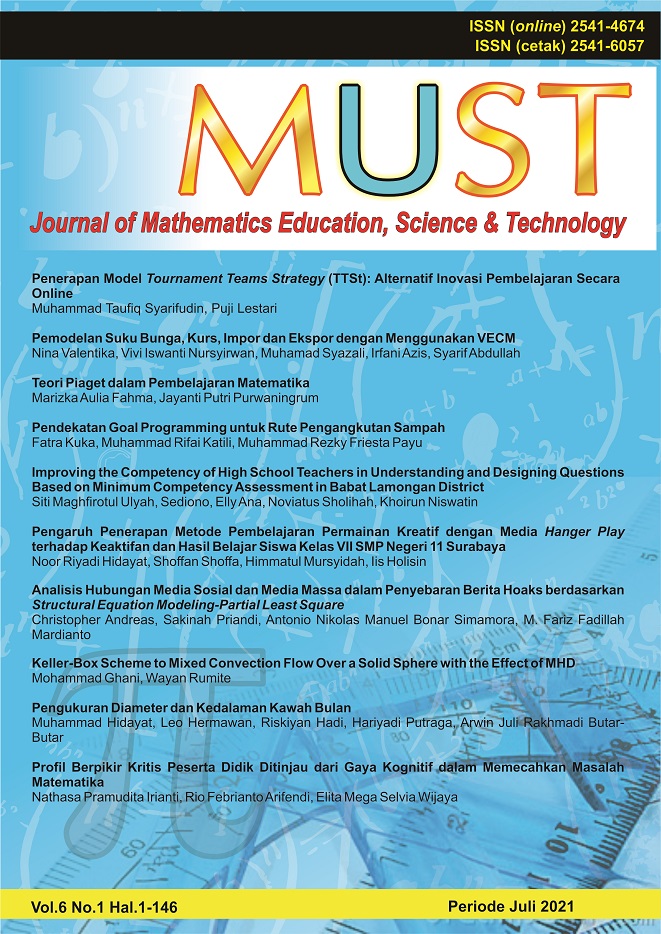Improving the Competency of High School Teachers in Understanding and Designing Questions Based on Minimum Competency Assessment in Babat Lamongan District
Abstract
One of the latest topics in the world of education is the presentation of policies regarding the replacement of the National Examination (UN) into a Minimum Competency Assessment (AKM) and a character survey by the Minister of Education and Culture. With the new policy, all schools and school residents must make preparations as early as possible. Because this policy has never been implemented before, most educators (teachers) do not have sufficient insight into AKM. Therefore, it is necessary to conduct research on teacher competence in understanding and designing AKM-based questions. Teachers will be given a workshop that aims to provide insight and competence for teachers to prepare for the implementation of AKM in the future with the target of mathematics and science teachers at the state high school level in Babat District (SMAN 1 Babat and MAN 2 Lamongan). Workshops and mentoring for teachers are provided to prepare themselves as pioneers in the implementation of AKM who have the ability to understand and design numeracy category questions. The teachers were given pre-test and post-test during the workshop and the results would be compared and analyzed descriptively with a quantitative approach. The results of the study stated that by giving the workshop, there was an increase in the ability of teachers to understand AKM-based questions by 24.19 points. However, in the ability to design AKM questions, there was only an increase of 5.95 points. Therefore, it is necessary to carry out further post-workshop mentoring.Â
Full text article
References
Arikunto, S. (2013). Prosedur penelitian suatu pendekatan praktik. Jakarta: PT. Rineka Cipta.
Bledsoe, T. S., & Baskin, J. J. (2014). Recognizing student fear: the elephant in the classroom. College Teaching, 62(1), 32-41.
Hadi, A., & Arwan. (2011). Pro kontra Ujian Nasional (UN) dalam sistem evaluasi pendidikan di Indonesia. Conciencia: Jurnal Pendidikan Islam, 11(2), 79-92.
Kemendikbud. (2019). Tahun 2021, ujian nasional diganti asesmen kompetensi dan survei karakter. Retrieved November 2020, 5, from Kementerian Pendidikan dan Kebudayaan: https://www.kemdikbud.go.id/main/ blog/2019/12/tahun-2021-ujian-nasional-diganti-asesmen-kompetensi-dan-survei-karakter.
Marhamah, S., Maiyastri, & Asdi Y. (2016). Studi prestasi mahasiswa dengan analisis statistika deskriptif (studi kasus: mahasiswa program studi matematika FMIPA Universitas Andalas tahun 2009-2011). Jurnal Matematika UNAND, 5(4), 36-44.
Ndiung, S., & Jediut, M. (2020). Pengembangan instrumen tes hasil belajar matematika peserta didik sekolah dasar berorientasi pada berpikir tingkat tinggi. Premiere Educandum: Jurnal Pendidikan Dasar dan Pembelajaran, 10(1), 94-111. http://doi.org/10.25273/pe.v10i1.6274
Novita, R., Zulkardi, & Hartono, Y. (2012). Exploring primary student's problem-solving ability by doing tasks like PISA's question. Indonesian Mathematical Society Journal on Mathematics Education, 3(2), 133-150. https://doi.org/10.22342/jme.3.2.571.133-150.
OECD. (2019). PISA 2018: latest result. Retrieved November 2020, 5, from PISA, Programme for International Student Assessment: https://www.oecd.org/pisa/
OECD. (2020). What is PISA?. Retrieved November 2020, 5, from PISA, Programme for International Student Assessment: https://www.oecd.org/pisa/
Rawani, D., Putri, R. I. I., & Hapizah. (2019). PISA-like mathematics problems: using taekwondo context of Asian games. Journal on Mathematics Education, 10(2), 277-288. https://doi.org/10.22342/jme.10.2.5243.277-288
Solehah, L. F. N. (2014). Faktor-faktor penyebab kecemasan siswa dalam menghadapi ujian nasional. Perspektif Ilmu Pendidikan, 25(16), 16-32. https://doi.org/10.21009/PIP.251.3
Wulandari, N. F., & Jailani. (2018). Mathematics skill of fifteen years old students in Yogyakarta in solving problems like PISA. Journal on Mathematics Education, 9(1), 129-144. https://doi.org/10.22342/jme.9.1.4231.129-144
Authors
Authors who publish with this journal agree to the following terms:
- Authors retain copyright and grant the journal right of first publication with the work simultaneously licensed under a Creative Commons Attribution-NonCommercial 4.0 International License that allows others to share the work with an acknowledgment of the work's authorship and initial publication in this journal.
- Authors are able to enter into separate, additional contractual arrangements for the non-exclusive distribution of the journal's published version of the work (e.g., post it to an institutional repository or publish it in a book), with an acknowledgment of its initial publication in this journal.
- Authors are permitted and encouraged to post their work online (e.g., in institutional repositories or on their website) prior to and during the submission process, as it can lead to productive exchanges, as well as earlier and greater citation of published work

